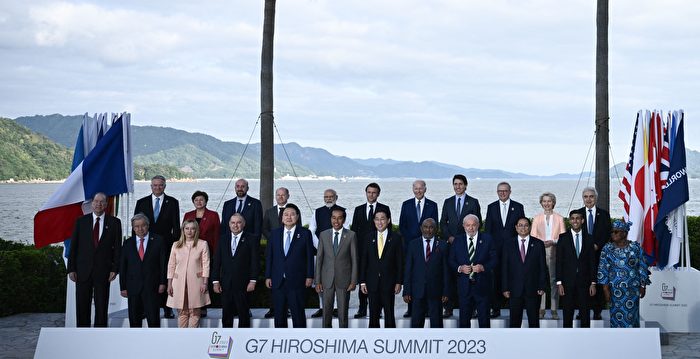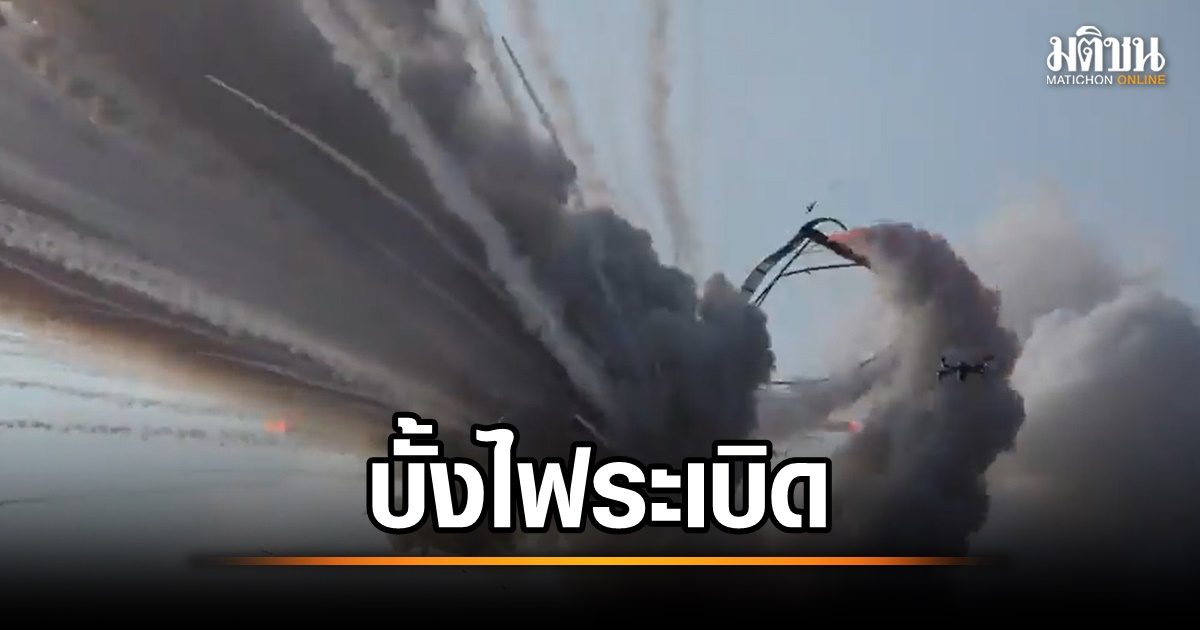The G7 summit held in Hiroshima on May 20, 2023, the family portrait of the G7 leaders and the invited national leaders. (BRENDAN SMIALOWSKI/POOL/AFP via Getty Images)
[The Epoch Times, May 21, 2023](Comprehensive report by Epoch Times reporter Cheng Jing) In the past three days, three large-scale summits in the world have appeared one after another, including the G7 summit, the China-Central Asia summit and the Arab League summit. At the G7 summit, the leaders of the seven countries condemned Russia and expressed their resistance to the CCP’s coercion, but the CCP strongly rebounded. The Central Asia Summit hosted by the Communist Party of China has been poured cold water on creating a “prosperous Tang scene”. According to the analysis, the CCP is drifting away from the mainstream of the world, and has fallen into many diplomatic difficulties.
G7 summit condemns Russia for resisting Beijing coercion
The Group of Seven (G7) summit, which debuted on Friday (19th), has attracted much attention. At the summit, issues such as the war in Ukraine, the situation in the Taiwan Strait, and Beijing’s economic coercion became important agenda items.
In the communiqué issued by the G7 on Saturday (20th) afternoon, Articles 51 and 52 focused on China, emphasizing that member states must resist the CCP’s economic coercion, but at the same time clearly stated that they should not decouple, but “de-risk”. On the issues of Taiwan, Xinjiang, Tibet, Hong Kong and the South China Sea, the G7 communiqué made clear statements again.
This year’s communiqué once again included Taiwan, reaffirming that peace and stability across the Taiwan Strait are indispensable to the security and prosperity of the international community, calling for the peaceful resolution of cross-strait issues, and strongly opposing any attempt to unilaterally change the status quo by force or coercion.
White House National Security Adviser Jack Sullivan said at a press conference in Hiroshima that the text on China in the communiqué was “totally straightforward,” “not hostile, nor gratuitous,” and “direct and frank.”
A day earlier, the G7 leaders of the United States, Canada, France, Germany, Italy, the United Kingdom, Japan and the European Union reaffirmed on Friday their “commitment to stand together against Russia’s illegal, unjustified and unprovoked war of aggression against Ukraine.”
The G7 statement also stated that “to mobilize all our policy tools, and together with Ukraine, make every effort to achieve a comprehensive, just and lasting peace in Ukraine as soon as possible”, emphasizing that without the “complete and unconditional withdrawal of Russian troops”, this peace cannot be achieved. The G7 announced a new round of sanctions against Russia.
Not long after the G7 announcement was issued, the Chinese Ministry of Foreign Affairs expressed “strong dissatisfaction, resolute opposition, and solemn representations” on Saturday night, condemning the G7 for “insistently manipulating China-related issues” and “grossly interfering in China’s internal affairs” and demanding that the G7 “reflect on itself, Change the course.”
The Central Asia Summit Created a “Prosperous Tang Dynasty Scene” Was Splashed with Cold Water
RFA quoted analysts as saying that most of the G7’s “China’s position” is a reaffirmation of principles, but the expressions are becoming more and more clear and there are fewer and fewer compromises. Judging from China’s strong reaction, the G7’s stated position should pour a bucket of cold water on Xi Jinping, who is still in the illusory “prosperous Tang scene” of “all nations coming to North Korea”.
“G7’s common hatred made the grand, luxurious and magnificent banquet in Xi’an lose its weight in an instant?”
The so-called “prosperous Tang scene” refers to the China-Central Asia Summit that will be held on Thursday (18th). Xinhua News Agency touted it as “the atmosphere of the prosperous Tang Dynasty, the demeanor of a great country. The great China, the state of etiquette”, “this welcome ceremony has a profound meaning”…
The two-day summit is chaired by Chinese Communist Party leader Xi Jinping. The five participating Central Asian countries include Kazakhstan, Kyrgyzstan, Tajikistan, Turkmenistan and Uzbekistan.
On Thursday, Xi Jinping and his wife, Peng Liyuan, held a banquet and a welcome performance in the Tang Paradise. The venue was covered with a bright red carpet, surrounded by lanterns, and the performers wore ancient costumes and danced.
In the screenshot titled “Xi Jinping and Peng Liyuan hold a welcome ceremony and welcome banquet for the leaders and wives of the five Central Asian countries”, there are “ancient court ladies” holding sticks in front, and “Tang” holding red banners with the word “Tang” in the back. Palace Guard”. Red palace, red lanterns, red chairs, carved beams and painted buildings, Qionglou Yuyu…
Xi Jinping also announced at the summit on Friday that the CCP will provide 26 billion yuan in free aid to Central Asian countries. The “China-Central Asia Technology and Skills Improvement Plan” will also be formulated, and “Luban Workshops” will be established in many countries in Central Asia.
Netizens said that the Tang Dynasty was “all nations came to court, all people rejoiced”, and the CCP’s circle of friends only had a few stans left, and they were still paying money; internally, it was closed like an enemy. Where did the “prosperous Tang atmosphere” come from?
The New York Times said in the article “China Hosts Central Asia Summit Against G7” that in 2013, Xi Jinping chose Kazakhstan as his vision for the “Belt and Road” initiative, but several “Belt and Road” projects in the region have stalled Or get involved in a scandal. The Associated Press reported that Beijing’s loans have pushed the economies of more than a dozen poor countries to the brink of collapse.
French “Le Figaro” commented that Xi’an, the former imperial capital and the starting point of the Silk Road, Xi Jinping sought strategic depth at the moment of “besieged by the United States” and competed with the former sphere of influence of Russia’s big brother, regardless of the Kremlin. palace sensitivity.
Xi Jinping Avoids Talking About Russia, Russo-Ukraine War
In fact, not only is it competing with Russia for Central Asia, Xi Jinping also did not mention the key topic of the G7 summit, the “Russia-Uzbekistan War” at the Central Asia Summit hosted by Xi Jinping.
The BBC reported that before the Central Asia Summit, some people predicted that China, which was trying to mediate peace between Moscow and Kiev, might make another statement during the summit and ask the five Central Asian countries to echo their voices.
But in fact, in Xi Jinping’s speech, the Xi’an Declaration and other summit public documents, there is no mention of the Ukraine war.
The report said that Russia’s invasion of Ukraine has pushed Central Asia into a dilemma. On the one hand, the five Central Asian countries will inevitably feel bitter; on the other hand, they will inevitably be implicated by Western sanctions due to their long-term dependence on Moscow in political and economic aspects. They neither condemned Russian aggression nor expressed support.
The CCP avoids this topic. But at this time, Li Hui, the special envoy sent by Xi Jinping to mediate the war between Russia and Ukraine, is still visiting Europe.
The outside world suspects that the CCP does not care about the reconciliation between Russia and Ukraine, but wants to fight against the world order dominated by the United States. Xi said the summit would be viewed as a historic milestone, which he described as a “new model” of international relations.
G7 and Arab League summit invited Zelensky to make a surprise appearance
Contrary to the CCP’s avoidance of talking about the Russia-Ukraine war, Ukrainian President Volodymyr Zelensky was invited to the G7 and Arab League summits.
On Saturday, Ukrainian President Volodymyr Zelensky, who was caught in the flames of war, unexpectedly appeared at the G7 summit. He was expected to appear via video call. It was his furthest trip from Kiev since Russia began its invasion of Ukraine 15 months ago.
Previously, Zelensky had intensively met with the leaders of the G7 member states, including France, Italy, the United Kingdom and Germany.
On Saturday, Zelensky attended the summit and held his first talks with Indian Prime Minister Narendra Modi since the Russia-Ukraine war. Modi, who has been ambiguous before, said this time that India will “do everything in its power” to help resolve the issue. This is considered by the outside world to be an indicative move.
The 22-member Arab League meeting in Jeddah, Saudi Arabia, on Friday also welcomed the unexpected guest, Ukrainian President Volodymyr Zelensky. The Arab countries are generally cautious about the Russia-Ukraine conflict and do not want to anger Moscow. However, Saudi Arabia, host of the Arab League summit, extended an invitation to Zelensky.
Deutsche Welle analyzed that for Ukraine, which is undergoing dramatic changes in the war, Zelensky’s appearance undoubtedly gave the Western liberal and democratic camp a shot in the arm. The visit at this moment has also brought Fumio Kishida from Hiroshima to a new wave of political momentum. The Japanese high-level executives privately stated: “No matter what it is, the result is a win-win situation.”
According to the analysis, Zelensky’s itinerary seems to be erratic, but it also shows the adaptability of leaders in troubled times. From the initial online participation to the last moment before the G7 main stage, Zelensky expressed to the world the sense of stability and confidence of the Ukrainian regime through this method.
And the CCP is drifting away from the mainstream of the world. Epoch Times columnist Wang Youqun commented that Beijing is caught in multiple diplomatic dilemmas, including confrontation with Western values, “pro-Russian neutrality” policy, frequent use of “economic coercion” to push other countries to make concessions on human rights issues, and “wolf warrior diplomacy” The frequent swearing has caused more and more governments and people to have a clear understanding of the nature of the CCP’s “false, evil, and fighting”, and the CCP’s credibility has been completely lost.
Editor in charge: Li Yuan #
#CCP #caught #diplomatic #dilemma #worlds #major #summits #Epoch #Times
2023-05-21 04:30:12


